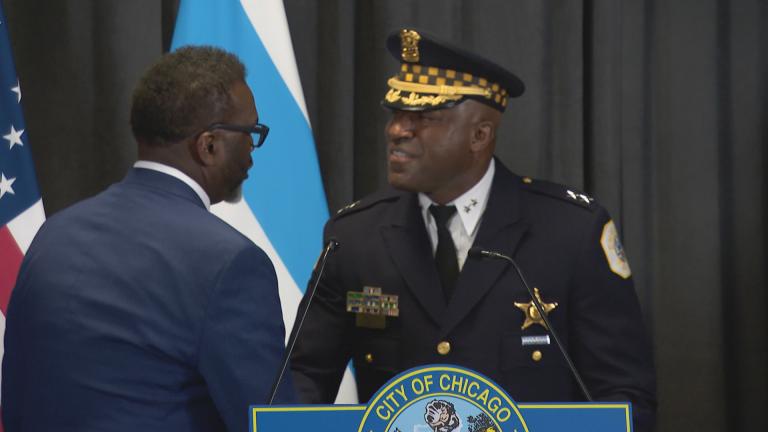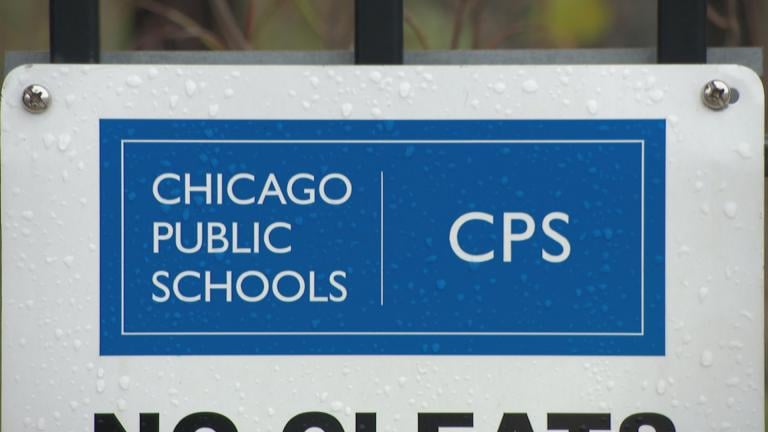Chicago Public Schools is set to remove resource officers from its buildings by this fall after officials passed a resolution requiring the district to develop a new safety model that doesn’t include police inside schools.
The city’s seven-member Board of Education on Wednesday unanimously approved the item, which directs CPS CEO Pedro Martinez to implement a new whole school safety policy, which “must make explicit that the use of SROs within District schools will end by the start of the 2024-2025 school year.”
“Schools that have participated in that program will be able to create whole school safety plans and receive funding to invest in alternative safety strategies,” Board President Jianan Shi said. “We are investing in schools and they will have an opportunity to decide how to use those funds.”
The board said the district’s new safety policy must be presented for final approval by its June 27 meeting.
The move away from SROs does not come as a surprise after Mayor Brandon Johnson previously gave the board his blessing to not renew its one-year, $10.3 million contract with the Chicago Police Department when it expires later this year.
“Public safety is the number one priority in the city of Chicago,” Johnson said this week. “What we have to do is provide a real holistic approach to creating an environment that does just that.”
Chicago and many other cities across the country began rethinking policing strategies following the murder of George Floyd by Minneapolis police in 2020.
That summer, students and advocates in Chicago began pushing CPS to remove all police from school buildings, saying their presence had a disproportionately negative impact on Black students and strengthened the school-to-prison pipeline.
Several students and youth advocates spoke during Thursday’s meeting, calling on CPS to end its SRO contract once and for all.
“Police do not prevent harm, they show up once harm has already been done (and) they do not have a sense of restorative justice,” said Jose Navarro, a senior at Curie High School. “Police are not keeping you safe, communities keep you safe.”
The board cited disproportionately higher rates of suspensions and 911 calls for Black students and those with disabilities. Expulsions in district schools are also disproportionately higher for Black and Latino male students.
CPS in 2020 began allowing individual local school councils to decide if they wanted to maintain or eliminate SRO positions at their schools. The district also retooled its agreements with the police department to better define SRO responsibilities and give school leaders more control over the officers working in their buildings.
“Four years later, many of these schools are thriving,” CTU Vice President Jackson Potter said. “The sky has not fallen and instead of off-duty officers patrolling the halls, many of these schools have full-time social workers (and) restorative justice coordinators that help students and staff navigate conflict and engage in restorative practices.”
Only 39 out of 634 district schools currently utilize SROs, according to the board, while the other campuses “instead employ a wide variety of tools to ensure students’ physical safety, including Crossing Guards, Safe Passage workers, security officers, and security cameras to ensure students can travel safely to and from school.”
In total, there are currently 57 total SROs working at those 39 schools. Since the district began allowing LSCs to decide on their schools’ safety policies, 14 schools have voted to remove a total of 28 SROs.
According to the board, those schools have instead received $3.9 million in total funds to be invested in staff- and program-related alternative safety interventions like climate and culture, restorative justice and social service coordinators.
“We don’t want police in schools because they don’t help the students better themselves,” said Adrian Franco, a member of the Brighton Park Neighborhood Council and a student at Curie High School, in a statement. “Instead, we are demanding $180k per officer for all the schools that currently have or had police in their schools. That money should be spent on bettering the school food, providing more mental health support for students, and providing better classroom materials.”
Dwayne Truss, a longtime education advocate who was on the board in 2020 when it began allowing LSCs to vote on their SROs, decried the resolution, saying the decision should stay with local school councils.
“We’re tired of the continued disrespect of the Black community, especially the Austin community,” he said during Thursday’s board meeting. “You did not come to our community asking what we wanted. You decided.”
Truss forced a brief recess following his comments as he continued shouting at board members and calling out CTU leadership over what he called “propaganda” he said was being shared during the meeting.
CPS students who took part in a roundtable discussion last month presented safety recommendations to the board Thursday, including that the district maintain “timely, regular and frequent” communication with the Chicago Police Department in order to help flag safety concerns in communities surrounding each school.
Chicago Police Superintendent Larry Snelling has said the SRO contract is “outside of our control,” but noted that officers will always have a role in school safety — even if that’s not inside the buildings.
“If those officers are removed from the schools, CPD is going to continue to do what we’ve always done: Protect our children, protect the streets when those kids are on their way to school, during arrival times we will have our officers present, we will have special attention as well as dismissals,” he said during a press conference Wednesday.
Snelling has previously spoken about his own relationship with the SRO at Englewood High School during his time as a student there, describing that officer as a “father figure” to him. He also pointed to the “great work” officers did inside schools as mentors.






